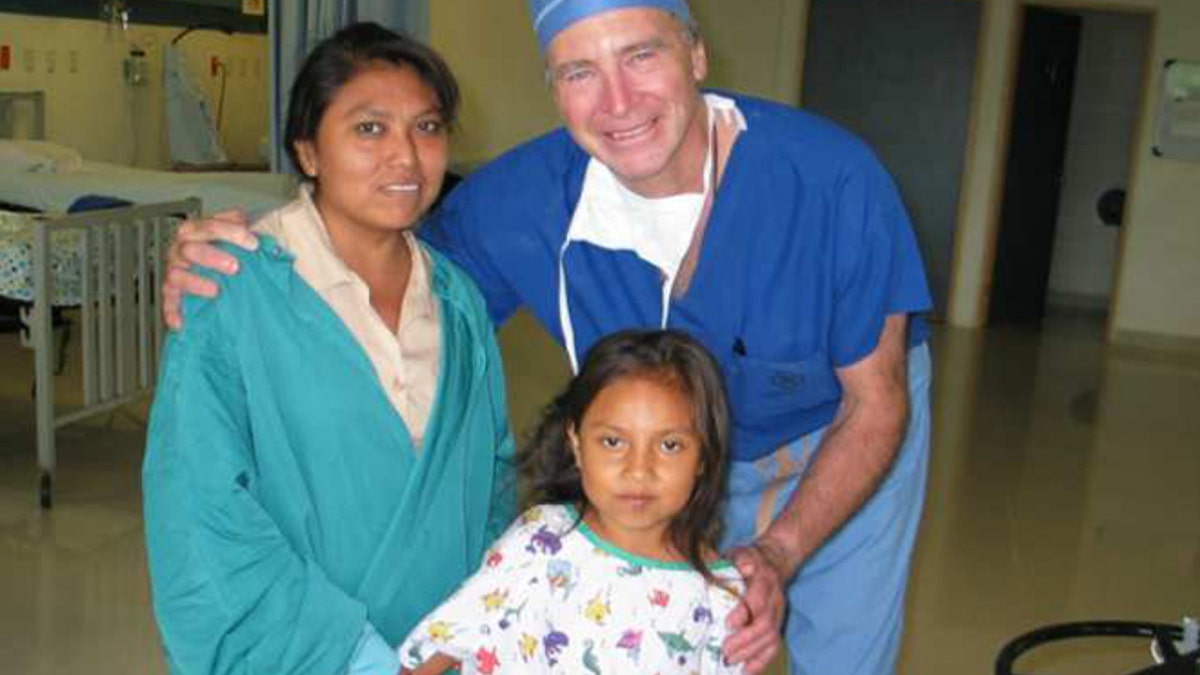
Dr. Paul Church seen in 2013 in a town in Mexico’s Yucatan Peninsula. He would make the journey for years to perform operations on the impoverished of the town.
A prominent Boston doctor and Harvard Medical School professor says a prestigious hospital canned him because he refused to endorse the LGBT lifestyle, which he believes is dangerous and unhealthy.
Dr. Paul Church clashed with officials at Beth Israel Deaconess Medical Center for years over the issue, bitterly opposing the hospital's policy of promoting such events as Gay Pride Week and "LGBT Achievement" awards ceremonies. The hospital's stance ignored overwhelming evidence that practices common in the LGBT increase the risk of disease and mental illness, according to Church, a Cornell-trained urologist who worked at the hospital for 28 years.
"They chose a social agenda that they wanted to promote," said Church, who likened a hospital holding a gay pride event to the same institution organizing an event to promote cigarette smoking.

(Church practiced medicine at the prestigious Beth Israel Deaconess Medical Center for 28 years. (BIDMC))
Church, 66, appeared to run out of options last month when the hospital's 25-member medical executive committee voted to expel him.
The hospital said in a statement to FoxNews.com that Church's behavior was "inconsistent with BIDMC's established standards of professional conduct."
"They chose a social agenda that they wanted to promote."
"Because this is a medical staff credentialing matter, we do not plan to comment further," the statement said.
Church said he was wrongfully removed and that his performance and relationship with patients were never an issue. He acknowledged sending provocative emails to hospital officials, which he said were aimed at fostering dialogue but were met with hostility.
In one 2009 email -- in a response to a BIDMC’s 16th annual LGBT Achievement Award ceremony invitation -- Church citied evidence that he said is “irrefutable.”
“Behaviors common within the homosexual community are unhealthy and high risk for a host of serious medical consequences, including STDs, HIV and AIDS, anal cancer, hepatitis, parasitic intestinal infections, and psychiatric disorders,” his email said. “Life expectancy is significantly decreased as a result of HIV/AIDS, complications from the other health problems, and suicide.”
Church said he asked the hospital to stop sending him emails promoting LGBT culture and events, but he continued to receive them.
Some members of the hospital staff were apparently offended by Church's remarks, some of which cited Bible verses, and an investigation into Church was conducted.
Church said he believes medical institutions must treat all patients, but should not actively promote LGBT values.
Richard Mast, his lawyer at the Liberty Council, said Church is out of options to get his job back with the hospital, but the ruling does not prevent him from practicing medicine. Church is still affiliated with two other hospitals and he also is an assistant professor at Harvard Medical School. He said if there is additional “collateral damage” he intends to fight back.
According to the Centers for Disease Control and Prevention’s website, gay, bisexual and other men who have sex with other men have higher rates of HIV and STDs. For example, these men are 40 times more likely to be HIV-positive than heterosexual men.
“These numbers are not my opinion,” Church said.
Doctors nationwide have tried to find an effective approach for increasing communications between LGBT patients and physicians. The University of Washington conducted a study published in the American Journal of Public Health that showed heterosexual health care providers maintain an “implicit preference” to treat heterosexual patients.”
Dr. Sean Cahill, director of policy research at the Fenway Institute, a Boston-based organization that focuses on research and health issues involving the LGBT community, applauds any hospital’s attempt to reach out to a community that can feel a bias when it comes to medical care. He said it is important that hospitals continue outreach.
“I think it’s a welcome development,” he said. “Anytime you send a message of inclusion -- let’s say having a rainbow sticker at the front desk -- you are making someone feel more accepted.”
Cahill was not familiar with the Church issue, but said recent studies suggest that a number of gays, lesbians and transgender patients have reported a discriminatory experience when receiving medical care. He pointed to a 2013 Fenway Institute and Gay Men’s Health Crisis study in New York that found that 35 percent of participants at the House of Latex Ball experienced discrimination in health care because they identified as LGBT.
Church pointed to his long career and “compassionate” and “respectful care” of dozens of patients who self identify as members of the LGBT community. He said at least one of his gay patients wrote a letter on his behalf during the investigation.
“I approach every patient with the same kind of care and dignity,” he said.
Dr. Jane M. Orient, an internist in Arizona and executive director of the Association of American Physicians and Surgeons, has covered Church’s story and believes he was treated unfairly.
“From what I’ve read, the internal communication from Church has not been proven untrue,” she said. She said there is little doubt that gay sex between men has proven to be a risky lifestyle.
“It is not the role of a good doctor to lie to a patient and deny that there are inherent risks,” she said.

